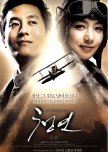Recent Discussions
-
 Dominant CEO trope dramas to find8 minutes ago
Dominant CEO trope dramas to find8 minutes ago -
 Last Drama You Completed? #226 minutes ago
Last Drama You Completed? #226 minutes ago -
 Tushan Jing and Xiao Yao, here's to a Happily Ever After47 minutes ago
Tushan Jing and Xiao Yao, here's to a Happily Ever After47 minutes ago -
 Older sister type FL53 minutes ago
Older sister type FL53 minutes ago -
 We Watch Challenge 202454 minutes ago
We Watch Challenge 202454 minutes ago


In June 1945 (Showa 20), Yamauchi Fusako goes alone to Manchuria where her husband, Setsuo, a second lieutenant of the Kwantung Army, is based. At that time, 200,000 Japanese had settled in Manchuria, a Japanese occupied territory, as settler communities. Fujita Hideo’s family worked hard to clear the wilderness, but the Soviets are lying in wait for an invasion of Manchuria from the North. Fusako is safely reunited with her husband at the headquarters of the Kwantung Army’s Fifth Training Squadron in Manchuria’s Dahushan. Setsuo also takes good care of his beloved wife, but his position is an instructor to the young soldiers who will eventually carry out suicide attacks. He wonders if he should have summoned her and speaks of these mixed feelings to his commanding officer, Michiba Kazuo, a first lieutenant. Michiba is concerned about Setsuo’s attempts to cherish his wife before the coming showdown on homeland. Fusako learns about life in Manchuria from Michiba’s wife, Etsu. In comparison to the interior, it not only had abundant food such as vegetables and rice, but also no air raids. Fusako’s welcome party and a celebratory party for an engaged couple, Setsuo’s colleague, Yuasa Tetsuo, and Inoue Hana, is held at night. Nishimura Tsuyoshi, Koguma Isamu, Kinoshita Tatsuo and other instructors drink together and the young soldiers simply stuff themselves with the food of Fusako and others. Fusako is happy to live together with Setsuo for the first time since they married that she seemingly forgets about the war. However, the village near the border where Fujita’s settler community lives, is finally invaded by the Soviet Army. They have to abandon the fields that they had struggled to cultivate and seek refuge in Dahushan. Then, the Kwantung Army also gives orders for sorties at last. Fusako’s peaceful days are about to quickly collapse.


In June 1945 (Showa 20), Yamauchi Fusako goes alone to Manchuria where her husband, Setsuo, a second lieutenant of the Kwantung Army, is based. At that time, 200,000 Japanese had settled in Manchuria, a Japanese occupied territory, as settler communities. Fujita Hideo’s family worked hard to clear the wilderness, but the Soviets are lying in wait for an invasion of Manchuria from the North. Fusako is safely reunited with her husband at the headquarters of the Kwantung Army’s Fifth Training Squadron in Manchuria’s Dahushan. Setsuo also takes good care of his beloved wife, but his position is an instructor to the young soldiers who will eventually carry out suicide attacks. He wonders if he should have summoned her and speaks of these mixed feelings to his commanding officer, Michiba Kazuo, a first lieutenant. Michiba is concerned about Setsuo’s attempts to cherish his wife before the coming showdown on homeland. Fusako learns about life in Manchuria from Michiba’s wife, Etsu. In comparison to the interior, it not only had abundant food such as vegetables and rice, but also no air raids. Fusako’s welcome party and a celebratory party for an engaged couple, Setsuo’s colleague, Yuasa Tetsuo, and Inoue Hana, is held at night. Nishimura Tsuyoshi, Koguma Isamu, Kinoshita Tatsuo and other instructors drink together and the young soldiers simply stuff themselves with the food of Fusako and others. Fusako is happy to live together with Setsuo for the first time since they married that she seemingly forgets about the war. However, the village near the border where Fujita’s settler community lives, is finally invaded by the Soviet Army. They have to abandon the fields that they had struggled to cultivate and seek refuge in Dahushan. Then, the Kwantung Army also gives orders for sorties at last. Fusako’s peaceful days are about to quickly collapse.


In June 1945 (Showa 20), Yamauchi Fusako goes alone to Manchuria where her husband, Setsuo, a second lieutenant of the Kwantung Army, is based. At that time, 200,000 Japanese had settled in Manchuria, a Japanese occupied territory, as settler communities. Fujita Hideo’s family worked hard to clear the wilderness, but the Soviets are lying in wait for an invasion of Manchuria from the North. Fusako is safely reunited with her husband at the headquarters of the Kwantung Army’s Fifth Training Squadron in Manchuria’s Dahushan. Setsuo also takes good care of his beloved wife, but his position is an instructor to the young soldiers who will eventually carry out suicide attacks. He wonders if he should have summoned her and speaks of these mixed feelings to his commanding officer, Michiba Kazuo, a first lieutenant. Michiba is concerned about Setsuo’s attempts to cherish his wife before the coming showdown on homeland. Fusako learns about life in Manchuria from Michiba’s wife, Etsu. In comparison to the interior, it not only had abundant food such as vegetables and rice, but also no air raids. Fusako’s welcome party and a celebratory party for an engaged couple, Setsuo’s colleague, Yuasa Tetsuo, and Inoue Hana, is held at night. Nishimura Tsuyoshi, Koguma Isamu, Kinoshita Tatsuo and other instructors drink together and the young soldiers simply stuff themselves with the food of Fusako and others. Fusako is happy to live together with Setsuo for the first time since they married that she seemingly forgets about the war. However, the village near the border where Fujita’s settler community lives, is finally invaded by the Soviet Army. They have to abandon the fields that they had struggled to cultivate and seek refuge in Dahushan. Then, the Kwantung Army also gives orders for sorties at last. Fusako’s peaceful days are about to quickly collapse.


In June 1945 (Showa 20), Yamauchi Fusako goes alone to Manchuria where her husband, Setsuo, a second lieutenant of the Kwantung Army, is based. At that time, 200,000 Japanese had settled in Manchuria, a Japanese occupied territory, as settler communities. Fujita Hideo’s family worked hard to clear the wilderness, but the Soviets are lying in wait for an invasion of Manchuria from the North. Fusako is safely reunited with her husband at the headquarters of the Kwantung Army’s Fifth Training Squadron in Manchuria’s Dahushan. Setsuo also takes good care of his beloved wife, but his position is an instructor to the young soldiers who will eventually carry out suicide attacks. He wonders if he should have summoned her and speaks of these mixed feelings to his commanding officer, Michiba Kazuo, a first lieutenant. Michiba is concerned about Setsuo’s attempts to cherish his wife before the coming showdown on homeland. Fusako learns about life in Manchuria from Michiba’s wife, Etsu. In comparison to the interior, it not only had abundant food such as vegetables and rice, but also no air raids. Fusako’s welcome party and a celebratory party for an engaged couple, Setsuo’s colleague, Yuasa Tetsuo, and Inoue Hana, is held at night. Nishimura Tsuyoshi, Koguma Isamu, Kinoshita Tatsuo and other instructors drink together and the young soldiers simply stuff themselves with the food of Fusako and others. Fusako is happy to live together with Setsuo for the first time since they married that she seemingly forgets about the war. However, the village near the border where Fujita’s settler community lives, is finally invaded by the Soviet Army. They have to abandon the fields that they had struggled to cultivate and seek refuge in Dahushan. Then, the Kwantung Army also gives orders for sorties at last. Fusako’s peaceful days are about to quickly collapse.


In June 1945 (Showa 20), Yamauchi Fusako goes alone to Manchuria where her husband, Setsuo, a second lieutenant of the Kwantung Army, is based. At that time, 200,000 Japanese had settled in Manchuria, a Japanese occupied territory, as settler communities. Fujita Hideo’s family worked hard to clear the wilderness, but the Soviets are lying in wait for an invasion of Manchuria from the North. Fusako is safely reunited with her husband at the headquarters of the Kwantung Army’s Fifth Training Squadron in Manchuria’s Dahushan. Setsuo also takes good care of his beloved wife, but his position is an instructor to the young soldiers who will eventually carry out suicide attacks. He wonders if he should have summoned her and speaks of these mixed feelings to his commanding officer, Michiba Kazuo, a first lieutenant. Michiba is concerned about Setsuo’s attempts to cherish his wife before the coming showdown on homeland. Fusako learns about life in Manchuria from Michiba’s wife, Etsu. In comparison to the interior, it not only had abundant food such as vegetables and rice, but also no air raids. Fusako’s welcome party and a celebratory party for an engaged couple, Setsuo’s colleague, Yuasa Tetsuo, and Inoue Hana, is held at night. Nishimura Tsuyoshi, Koguma Isamu, Kinoshita Tatsuo and other instructors drink together and the young soldiers simply stuff themselves with the food of Fusako and others. Fusako is happy to live together with Setsuo for the first time since they married that she seemingly forgets about the war. However, the village near the border where Fujita’s settler community lives, is finally invaded by the Soviet Army. They have to abandon the fields that they had struggled to cultivate and seek refuge in Dahushan. Then, the Kwantung Army also gives orders for sorties at last. Fusako’s peaceful days are about to quickly collapse.


In June 1945 (Showa 20), Yamauchi Fusako goes alone to Manchuria where her husband, Setsuo, a second lieutenant of the Kwantung Army, is based. At that time, 200,000 Japanese had settled in Manchuria, a Japanese occupied territory, as settler communities. Fujita Hideo’s family worked hard to clear the wilderness, but the Soviets are lying in wait for an invasion of Manchuria from the North. Fusako is safely reunited with her husband at the headquarters of the Kwantung Army’s Fifth Training Squadron in Manchuria’s Dahushan. Setsuo also takes good care of his beloved wife, but his position is an instructor to the young soldiers who will eventually carry out suicide attacks. He wonders if he should have summoned her and speaks of these mixed feelings to his commanding officer, Michiba Kazuo, a first lieutenant. Michiba is concerned about Setsuo’s attempts to cherish his wife before the coming showdown on homeland. Fusako learns about life in Manchuria from Michiba’s wife, Etsu. In comparison to the interior, it not only had abundant food such as vegetables and rice, but also no air raids. Fusako’s welcome party and a celebratory party for an engaged couple, Setsuo’s colleague, Yuasa Tetsuo, and Inoue Hana, is held at night. Nishimura Tsuyoshi, Koguma Isamu, Kinoshita Tatsuo and other instructors drink together and the young soldiers simply stuff themselves with the food of Fusako and others. Fusako is happy to live together with Setsuo for the first time since they married that she seemingly forgets about the war. However, the village near the border where Fujita’s settler community lives, is finally invaded by the Soviet Army. They have to abandon the fields that they had struggled to cultivate and seek refuge in Dahushan. Then, the Kwantung Army also gives orders for sorties at last. Fusako’s peaceful days are about to quickly collapse.


In June 1945 (Showa 20), Yamauchi Fusako goes alone to Manchuria where her husband, Setsuo, a second lieutenant of the Kwantung Army, is based. At that time, 200,000 Japanese had settled in Manchuria, a Japanese occupied territory, as settler communities. Fujita Hideo’s family worked hard to clear the wilderness, but the Soviets are lying in wait for an invasion of Manchuria from the North. Fusako is safely reunited with her husband at the headquarters of the Kwantung Army’s Fifth Training Squadron in Manchuria’s Dahushan. Setsuo also takes good care of his beloved wife, but his position is an instructor to the young soldiers who will eventually carry out suicide attacks. He wonders if he should have summoned her and speaks of these mixed feelings to his commanding officer, Michiba Kazuo, a first lieutenant. Michiba is concerned about Setsuo’s attempts to cherish his wife before the coming showdown on homeland. Fusako learns about life in Manchuria from Michiba’s wife, Etsu. In comparison to the interior, it not only had abundant food such as vegetables and rice, but also no air raids. Fusako’s welcome party and a celebratory party for an engaged couple, Setsuo’s colleague, Yuasa Tetsuo, and Inoue Hana, is held at night. Nishimura Tsuyoshi, Koguma Isamu, Kinoshita Tatsuo and other instructors drink together and the young soldiers simply stuff themselves with the food of Fusako and others. Fusako is happy to live together with Setsuo for the first time since they married that she seemingly forgets about the war. However, the village near the border where Fujita’s settler community lives, is finally invaded by the Soviet Army. They have to abandon the fields that they had struggled to cultivate and seek refuge in Dahushan. Then, the Kwantung Army also gives orders for sorties at last. Fusako’s peaceful days are about to quickly collapse.


In June 1945 (Showa 20), Yamauchi Fusako goes alone to Manchuria where her husband, Setsuo, a second lieutenant of the Kwantung Army, is based. At that time, 200,000 Japanese had settled in Manchuria, a Japanese occupied territory, as settler communities. Fujita Hideo’s family worked hard to clear the wilderness, but the Soviets are lying in wait for an invasion of Manchuria from the North. Fusako is safely reunited with her husband at the headquarters of the Kwantung Army’s Fifth Training Squadron in Manchuria’s Dahushan. Setsuo also takes good care of his beloved wife, but his position is an instructor to the young soldiers who will eventually carry out suicide attacks. He wonders if he should have summoned her and speaks of these mixed feelings to his commanding officer, Michiba Kazuo, a first lieutenant. Michiba is concerned about Setsuo’s attempts to cherish his wife before the coming showdown on homeland. Fusako learns about life in Manchuria from Michiba’s wife, Etsu. In comparison to the interior, it not only had abundant food such as vegetables and rice, but also no air raids. Fusako’s welcome party and a celebratory party for an engaged couple, Setsuo’s colleague, Yuasa Tetsuo, and Inoue Hana, is held at night. Nishimura Tsuyoshi, Koguma Isamu, Kinoshita Tatsuo and other instructors drink together and the young soldiers simply stuff themselves with the food of Fusako and others. Fusako is happy to live together with Setsuo for the first time since they married that she seemingly forgets about the war. However, the village near the border where Fujita’s settler community lives, is finally invaded by the Soviet Army. They have to abandon the fields that they had struggled to cultivate and seek refuge in Dahushan. Then, the Kwantung Army also gives orders for sorties at last. Fusako’s peaceful days are about to quickly collapse.


In June 1945 (Showa 20), Yamauchi Fusako goes alone to Manchuria where her husband, Setsuo, a second lieutenant of the Kwantung Army, is based. At that time, 200,000 Japanese had settled in Manchuria, a Japanese occupied territory, as settler communities. Fujita Hideo’s family worked hard to clear the wilderness, but the Soviets are lying in wait for an invasion of Manchuria from the North. Fusako is safely reunited with her husband at the headquarters of the Kwantung Army’s Fifth Training Squadron in Manchuria’s Dahushan. Setsuo also takes good care of his beloved wife, but his position is an instructor to the young soldiers who will eventually carry out suicide attacks. He wonders if he should have summoned her and speaks of these mixed feelings to his commanding officer, Michiba Kazuo, a first lieutenant. Michiba is concerned about Setsuo’s attempts to cherish his wife before the coming showdown on homeland. Fusako learns about life in Manchuria from Michiba’s wife, Etsu. In comparison to the interior, it not only had abundant food such as vegetables and rice, but also no air raids. Fusako’s welcome party and a celebratory party for an engaged couple, Setsuo’s colleague, Yuasa Tetsuo, and Inoue Hana, is held at night. Nishimura Tsuyoshi, Koguma Isamu, Kinoshita Tatsuo and other instructors drink together and the young soldiers simply stuff themselves with the food of Fusako and others. Fusako is happy to live together with Setsuo for the first time since they married that she seemingly forgets about the war. However, the village near the border where Fujita’s settler community lives, is finally invaded by the Soviet Army. They have to abandon the fields that they had struggled to cultivate and seek refuge in Dahushan. Then, the Kwantung Army also gives orders for sorties at last. Fusako’s peaceful days are about to quickly collapse.


In June 1945 (Showa 20), Yamauchi Fusako goes alone to Manchuria where her husband, Setsuo, a second lieutenant of the Kwantung Army, is based. At that time, 200,000 Japanese had settled in Manchuria, a Japanese occupied territory, as settler communities. Fujita Hideo’s family worked hard to clear the wilderness, but the Soviets are lying in wait for an invasion of Manchuria from the North. Fusako is safely reunited with her husband at the headquarters of the Kwantung Army’s Fifth Training Squadron in Manchuria’s Dahushan. Setsuo also takes good care of his beloved wife, but his position is an instructor to the young soldiers who will eventually carry out suicide attacks. He wonders if he should have summoned her and speaks of these mixed feelings to his commanding officer, Michiba Kazuo, a first lieutenant. Michiba is concerned about Setsuo’s attempts to cherish his wife before the coming showdown on homeland. Fusako learns about life in Manchuria from Michiba’s wife, Etsu. In comparison to the interior, it not only had abundant food such as vegetables and rice, but also no air raids. Fusako’s welcome party and a celebratory party for an engaged couple, Setsuo’s colleague, Yuasa Tetsuo, and Inoue Hana, is held at night. Nishimura Tsuyoshi, Koguma Isamu, Kinoshita Tatsuo and other instructors drink together and the young soldiers simply stuff themselves with the food of Fusako and others. Fusako is happy to live together with Setsuo for the first time since they married that she seemingly forgets about the war. However, the village near the border where Fujita’s settler community lives, is finally invaded by the Soviet Army. They have to abandon the fields that they had struggled to cultivate and seek refuge in Dahushan. Then, the Kwantung Army also gives orders for sorties at last. Fusako’s peaceful days are about to quickly collapse.


In June 1945 (Showa 20), Yamauchi Fusako goes alone to Manchuria where her husband, Setsuo, a second lieutenant of the Kwantung Army, is based. At that time, 200,000 Japanese had settled in Manchuria, a Japanese occupied territory, as settler communities. Fujita Hideo’s family worked hard to clear the wilderness, but the Soviets are lying in wait for an invasion of Manchuria from the North. Fusako is safely reunited with her husband at the headquarters of the Kwantung Army’s Fifth Training Squadron in Manchuria’s Dahushan. Setsuo also takes good care of his beloved wife, but his position is an instructor to the young soldiers who will eventually carry out suicide attacks. He wonders if he should have summoned her and speaks of these mixed feelings to his commanding officer, Michiba Kazuo, a first lieutenant. Michiba is concerned about Setsuo’s attempts to cherish his wife before the coming showdown on homeland. Fusako learns about life in Manchuria from Michiba’s wife, Etsu. In comparison to the interior, it not only had abundant food such as vegetables and rice, but also no air raids. Fusako’s welcome party and a celebratory party for an engaged couple, Setsuo’s colleague, Yuasa Tetsuo, and Inoue Hana, is held at night. Nishimura Tsuyoshi, Koguma Isamu, Kinoshita Tatsuo and other instructors drink together and the young soldiers simply stuff themselves with the food of Fusako and others. Fusako is happy to live together with Setsuo for the first time since they married that she seemingly forgets about the war. However, the village near the border where Fujita’s settler community lives, is finally invaded by the Soviet Army. They have to abandon the fields that they had struggled to cultivate and seek refuge in Dahushan. Then, the Kwantung Army also gives orders for sorties at last. Fusako’s peaceful days are about to quickly collapse.


In June 1945 (Showa 20), Yamauchi Fusako goes alone to Manchuria where her husband, Setsuo, a second lieutenant of the Kwantung Army, is based. At that time, 200,000 Japanese had settled in Manchuria, a Japanese occupied territory, as settler communities. Fujita Hideo’s family worked hard to clear the wilderness, but the Soviets are lying in wait for an invasion of Manchuria from the North. Fusako is safely reunited with her husband at the headquarters of the Kwantung Army’s Fifth Training Squadron in Manchuria’s Dahushan. Setsuo also takes good care of his beloved wife, but his position is an instructor to the young soldiers who will eventually carry out suicide attacks. He wonders if he should have summoned her and speaks of these mixed feelings to his commanding officer, Michiba Kazuo, a first lieutenant. Michiba is concerned about Setsuo’s attempts to cherish his wife before the coming showdown on homeland. Fusako learns about life in Manchuria from Michiba’s wife, Etsu. In comparison to the interior, it not only had abundant food such as vegetables and rice, but also no air raids. Fusako’s welcome party and a celebratory party for an engaged couple, Setsuo’s colleague, Yuasa Tetsuo, and Inoue Hana, is held at night. Nishimura Tsuyoshi, Koguma Isamu, Kinoshita Tatsuo and other instructors drink together and the young soldiers simply stuff themselves with the food of Fusako and others. Fusako is happy to live together with Setsuo for the first time since they married that she seemingly forgets about the war. However, the village near the border where Fujita’s settler community lives, is finally invaded by the Soviet Army. They have to abandon the fields that they had struggled to cultivate and seek refuge in Dahushan. Then, the Kwantung Army also gives orders for sorties at last. Fusako’s peaceful days are about to quickly collapse.


Both shows delve deeply into the theme of unrequited love. In Theory of Love, Third has feelings for his best friend, while in Bad Guy My Boss, Pat struggles with complex feelings toward his boss.


This review my contain spoilers
I made a suggestion that would definitely create a better trauma for you than this. Definitely 100 times better than Mr. Plankton Kdrama. If you like this kind of ending, I definitely recommend you to watch this movie. Also, you will watch the journey of pure love in the movie.
I made a suggestion that would definitely create a better trauma for you than this. Definitely 100 times better than Mr. Plankton Kdrama. If you like this kind of ending, I definitely recommend you to watch this movie. Also, you will watch the journey of pure love in the movie.
Both deal with the unsuspecting killer...the person who inserts themself into an investigation, the person that people look past as the killer, the person that someone knows is the killer but is halfway protecting them or turning a blind-eye. They are the same because both the main leads that are the likely killers are mentally ill, except one is aware of why they are doing what they are doing, and the other has no memory (if my memory serves me correctly) that they are even killing people.
Both have that slow pacing that you love to hate when it comes to suspenisful , mysterious, who did it dramas. That said, you are going to like this drama.
Both have that slow pacing that you love to hate when it comes to suspenisful , mysterious, who did it dramas. That said, you are going to like this drama.




